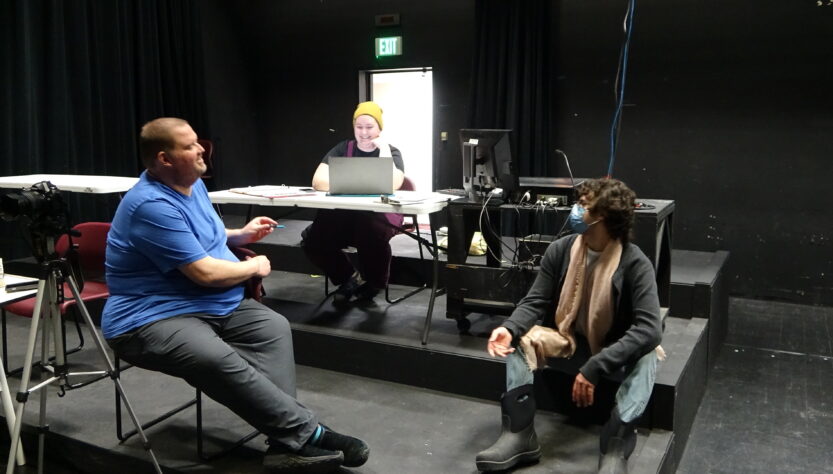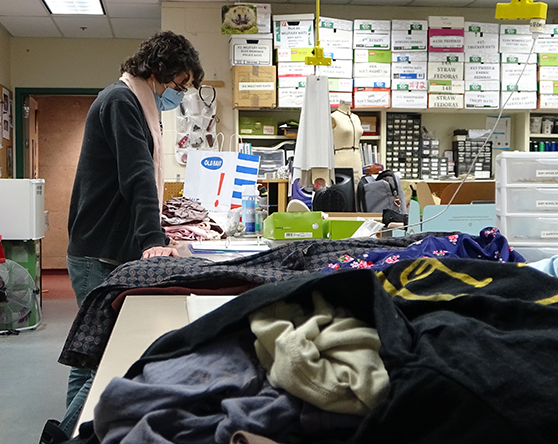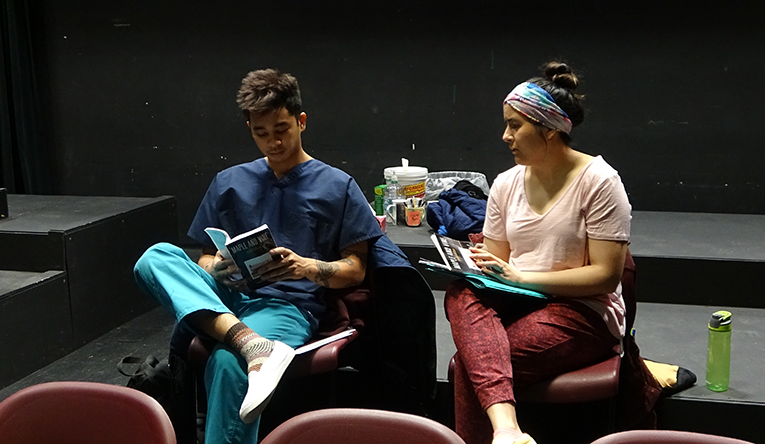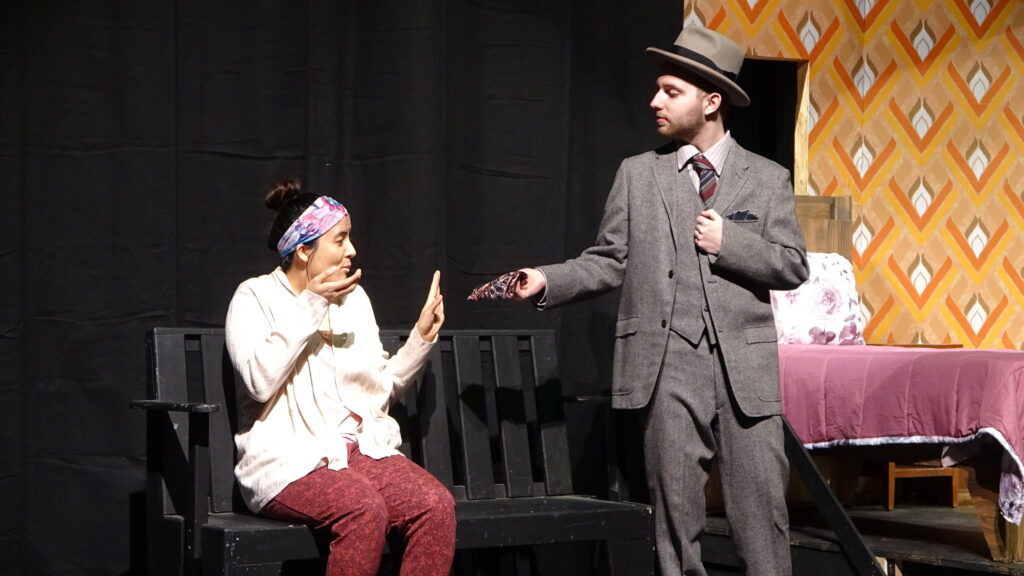How Alaska’s best Theatre program was slated to meet it’s end… and how it plans to manage a strong final act.
Story and Photos by David Harding
Stepping into the UAA Harper Studio, dubbed the “black box” by the students and faculty that ply their trade within its walls, is like entering another dimension. Everything, from the well-maintained floor to the catwalks that hang above, are a certain shade of black. There’s nothing besides a row of mirrors that line the leftmost wall, wooden risers near the entrance door, and a few scant props at the back and at the center of the space.
A dark void, tranquil in its isolation from the rest of the building, just waiting to come alive from the work of actors, set builders, costume designers, and the vision of the play’s director. This black box is set to have its vast space filled by a production for the first time since March 2020 with “Maple and Vine” from March 24th to April 3rd.
However, this run is bittersweet for UAA Theatre and Dance faculty and students, as its return marks one of the last performances the department will ever produce
The trouble for the department began in 2020, with the shocking news of a near $70 million cut to the University of Alaska’s funding from the state government. Thanks to the new financial realities, the University of Alaska Board of Regents made recommendations to eliminate several programs seen as unfit for preparing students for the Alaskan workforce. The programs considered for deletion ranged from master’s degrees in courses such as creative writing to entire programs such as sociology and of course, Theatre and Dance. This meant that no longer would new students be able to enroll in the degree, although remaining majors would be able to finish their remaining classes.
This situation was known to the UAA theatre department and its small yet dedicated student body as soon as preparation for the production of Machinal in spring 2020 began. The sudden onset of the COVID-19 pandemic further complicated matters. Live theater became impossible, and students still working towards their degrees faced the challenge of completing theater courses over online delivery.
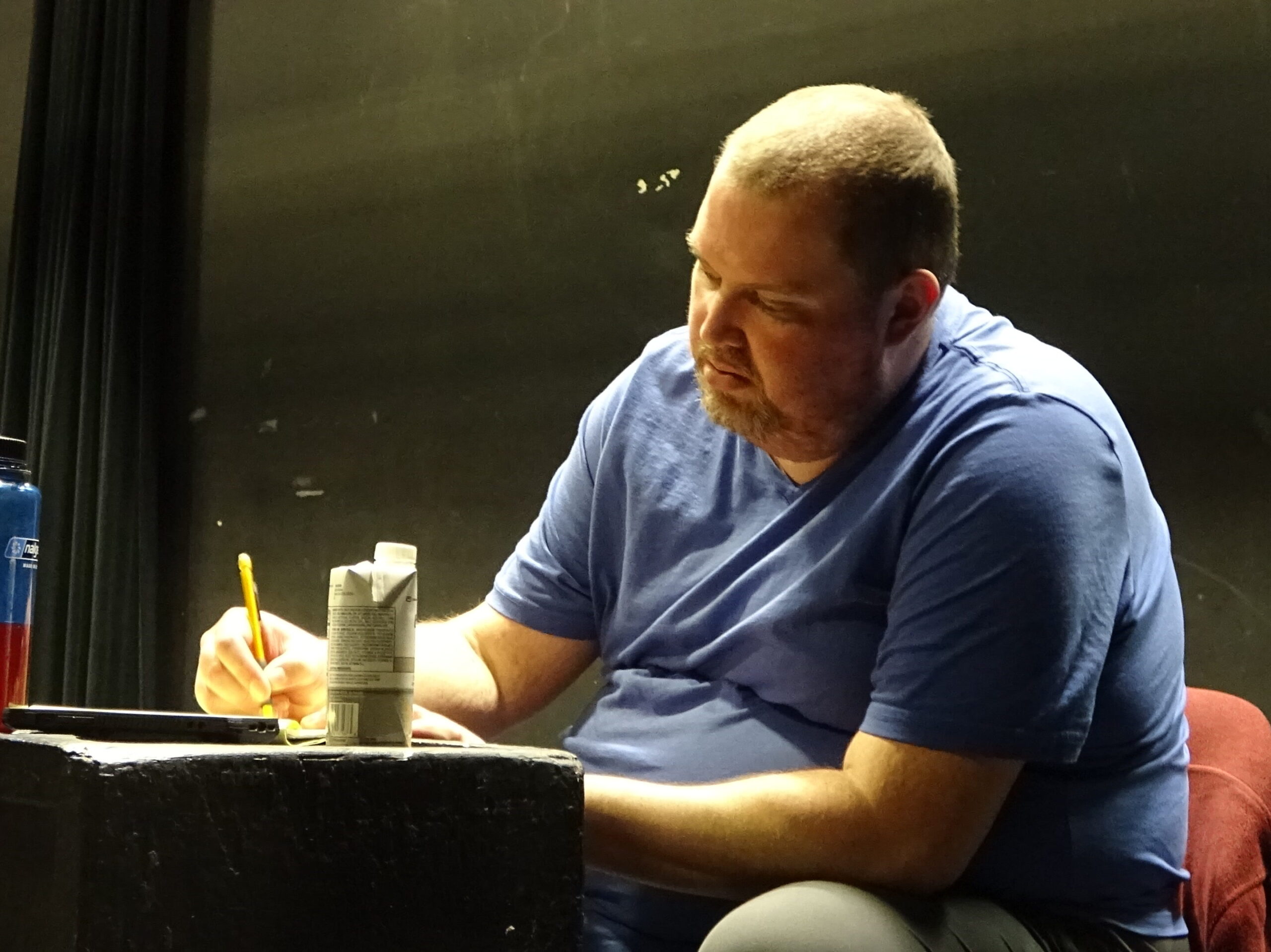
“When we were originally deleted in 2020, we had lots of support from a bunch of people, both in the state and outside of the state, writing letters on our behalf,” said Brian Cook, the department chair of Theatre and Dance who has been involved with the program for seven years. “They were concerned about many different things going on in Alaskan higher education, but particularly theater programs being targeted. We really did have a wave of people that came to our defense, to no avail, unfortunately”
The UAA theatre program worked as hard as it could to get around the physical barriers; all its shows in the 2020-2021 season were not performed live, but filmed and streamed. The next live event the department was able to host was a Haunted House in October 2021, under strict masking requirements for the actors and the UAA students and faculty allowed to attend.
Despite some painful releases of long-tenured staff and the loss of certain classes, the remaining theater faculty were determined to give students like Blake Blanning, who is the lead costume designer for Maple and Vine, the best education possible to prepare for professional work.
“It’s definitely a somber thing to think about; as being one of the last of this generation that gets to experience this theatre department. I do wish I got to see more people holed up here as I am in the costume shop,” Banning said. “In my costume construction class I’m the only student. In my resume and portfolio class I’m the only student. There’s not many of us left.”
Besides sewing for a local clothing company, Alpine Fit, over the summer, the skills Banning has learned from his time in the theatre program and his work in the costume department has given him the opportunity for invitations to work on shows out of state, including the annual Glimmerglass Opera Festival in New York.
“I’m graduating at a very young age, I’m only 20. I’m graduating in three years from what’s supposed to be a five-year program; the theatre major, dance minor, and honors college classes. So I definitely want to take a few years off to travel and get experience under my belt.”
The final hope for the theatre department came from a proposal given to the Provost in Fall 2021 that called for an institution of a theatre minor, similar to the existing dance minor, but the proposal was rejected. The program’s deletion was now inevitable. As soon as the last few students working to complete their theatre majors graduate, the department will cease to be. No classes, no productions, and most, if not all, of the faculty, talented men and women who’ve dedicated their lives to the art of stagecraft and have spent years instructing students in UAA, will have to look toward future endeavors.
The date this liquidation will come to be is in Spring 2023; leaving two more seasons of UAA Theatre to go before the stage lights go out for good.
“If there isn’t a department, there won’t necessarily be students who will be actively working on producing shows,” Cook said., “That’s going to make things like ‘who runs the box office’ or ‘who runs house management’ or ‘who runs the technical stuff in each of the theaters for rentals’ very difficult. My hope is the Dean will see fit to keep a couple of us around teaching some number of classes, but at this point there aren’t any guarantees”
One of the biggest questions remaining is what the two stages in the Fine Arts Center, the home for theatre, music, and several art classes and programs since the beginning of UAA’s lifespan, will be used for when the department that utilized them the most is gone?
“They are hiring someone to run the venues here. That could be a faculty member… it could be something else, but only time can tell on that one,” Cook said, referring to a new opening in UAA’s faculty for venue management, including the soon-to-be vacant stages at the Fine Arts Building. Cook hopes that the spaces will remain theater spaces, able to be rented out by theater groups or even students in a similar way to the recital halls in the same building.
The Ripple Effect
The loss of the theatre department doesn’t just come as a loss for students, alumni, and faculty alike, but for the theater community in Anchorage and Alaska as a whole.
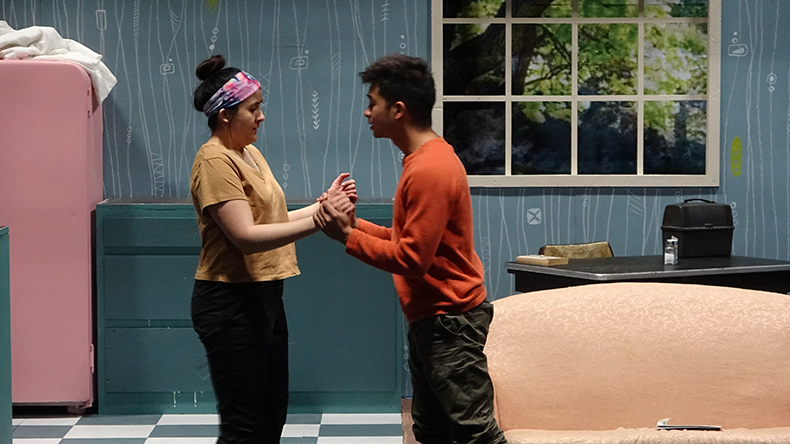
Frank Delaney, managing director for Perseverance Theatre, is keenly aware of the effects the end of UAA Theatre will bring. As Alaska’s only professional theater company, Perseverance looks for well-trained, experienced actors and production team members to make its shows possible. Delaney, himself holding a Bachelor’s degree in Theatre from UAA, sees the loss of the Theatre department as being the loss of the best training platform for local talent.
“Without [the Theatre program], people looking to get involved in professional theater will look out of state for training, they have no other choice, and they may not come back,” Delaney expressed his worry about losing not just graduating or current students on shows, but tenured faculty members such as Colleen Metzger, one of the only professionally trained costume designers for Theater productions in Alaska, as they search for opportunities and employment.
While Perseverance, and community organizations such as the Anchorage Community Theatre (ACT) provide educational opportunities for those involved in shows, Delaney made note that there’s currently nothing as thorough and dedicated to stage acting as UAA’s Theatre program currently available, or that will be available when the department is gone.
“The effects may not be severe in the short term, but long term, we will feel this loss for years to come,”
Aside from his position in Perseverance, Delaney is offering his years of acting experience to help guide students in rehearsals for Maple and Vine. He also hopes that the stages at the Fine Arts Center could be utilized for future productions from Perseverance in Anchorage; although it will never fully recoup the impact of the loss of the department on professional and community theater across the state.
When the Spring of 2023 brings an end to Cook’s tenure as department chair, he has several possibilities in mind, ranging from remaining in UAA in a different faculty role to going to another university to continue teaching the art form he loves the most.
“I know how long I have left here, so I’m sort of calculating and biding my time in deciding what the course of action I want to take is.”
After a long, thoughtful pause, Banning told me what his three years of UAA theatre have taught him more than anything else.
“There’s always a future for you somewhere, and there’s a way I can use the skills that I’ve learned and apply them to other fields in different ways.”
Even when the UAA theatre department ceases to be, its legacy will live on forever through the impact that alumni and faculty have left and will leave on the world of theater in Anchorage and beyond.
Read David Harding’s “Maple and Vine” review here.

